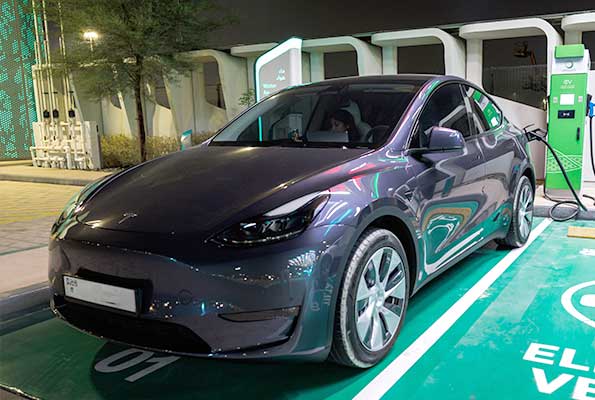In the projected 2024–2028 period, the UAE’s electric car charging infrastructure market is anticipated to expand at a robust CAGR (Compound Annual Growth Rate).
Over the next five years, it is also anticipated that market demand will increase due to technological developments that will reduce charging times and the quick building of EV charging stations.
Supportive Initiatives From The Government
Despite the UAE’s massive energy reserves, the authorities are increasingly turning to renewable energy sources due to the volatile oil prices and the restricted availability of conventional energy sources.
The UAE government has started encouraging electric vehicles as part of its ‘UAE Vision 2021’. Under this, some 175 charging stations were installed in 2021 alone. About 200 Tesla electric vehicles will be introduced to the Dubai taxi industry. According to the government’s plans for green mobility, autonomous vehicles will make up 25% of trips by 2030.
Additionally, the Roads and Transport Authority (RTA) is working to eliminate emissions from public transportation by 2050.
Market participants concentrate on R&D activities to produce novel solutions and improve the current infrastructure by shortening the charging time. While static charging stations are being installed in numerous locations, mobile platforms such as portable chargers, charging vans, and quick chargers, are becoming increasingly popular because they allow car owners to set their electric vehicles on the side of the road.
The introduction of wall-based high-speed hyper charging capacitance has also brought a considerable advantage by reducing the charging time in half. UAE’s electric car charging infrastructure is now anticipated to experience profitable growth during the forecast period due to ongoing technological developments and high-end expenditures made by industry participants to introduce cutting-edge goods.
The installation of electric vehicle charging stations is also driven by a rise in the growing demand for electric vehicles due to increased environmental concerns.
Industry players are now concentrating on introducing high-performance cars to the market, ranging from small hatchbacks to sedans. Additionally, it is anticipated that the market demand will be impacted by the country’s expanding road network and rising urbanization, along with the increasing consumer spending power and rising living standards.
Electric Vehicle Innovation Summit
The UAE’s electric vehicle market is expanding quickly. Naser Al Bahri, Director of the Electric Vehicle Innovation Summit (EVIS), credited the nation’s efforts to develop a cutting-edge infrastructure and set up electric charging stations as a factor behind the trend.
Al Bahri also predicted that between 2023 and 2027, the EV market would expand at a pace of 27.2% annually, in a statement to the Emirates News Agency (WAM).
He also emphasized the UAE’s innovative plans and measures to encourage the use of EVs among the general public, supported by a cutting-edge infrastructure that complies with the strictest global standards.
Then, in line with the UAE’s investment in sustainable solutions and its strategic initiative to achieve climate neutrality by 2050, he reaffirmed the country’s interest in developing a sustainable transportation sector, a significant global carbon emission source. He also highlighted the role that EVs play in reducing greenhouse gas emissions.
Al Bahri added that the UAE was prepared to welcome world leaders to COP28. In this year’s EVIS, 30 nations and a broad spectrum of businesses showcased their EV products.
The UAE is setting the pace for the region’s adoption of EVs, with more than 20% of its fleets of government vehicles running on electric power as of 2021.
At the Abu Dhabi National Exhibition Centre (ADNEC), the second edition of the Electric Vehicles Innovation Summit (EVIS2023) was attended by Suhail bin Mohammed Al Mazrouei, Minister of Energy and Infrastructure. The summit lasted three days and had a sizable exhibition.
With the addition of more than 100 products, including vehicles and EV service providers, the exhibition space got enlarged this year. In addition, EVIS2023 included a two-day conference that attracted much interest. It had over 100 speakers and more than 50 conference sessions that covered various subjects pertinent to the present and future state of e-mobility.
The conference aimed to encourage the switch from fossil fuel reliance to electric transportation, which protects the globe from the adverse effects of CO2 and other emissions on the ecosystem.
Transportation is second only to the electricity industry in contributing to global greenhouse gas emissions, at 17%. Pressure is mounting for the automotive industry to adopt e-mobility.
To examine the existing environment and potential future problems and possibilities, the summit’s two-day conference brought together participants, experts, and leaders of the mobility industry from dozens of nations. Over 75 sessions covering the whole value chain of the EV business were included, along with keynote speakers, presentations, and panel discussions.
The Technology Park, an innovation hub highlighting the newest developments in e-mobility, is a significant addition to the 2023 chapter of the event. The cutting-edge EV technologies created by universities and technology incubators were highlighted in this section, influencing the direction of the sector.



